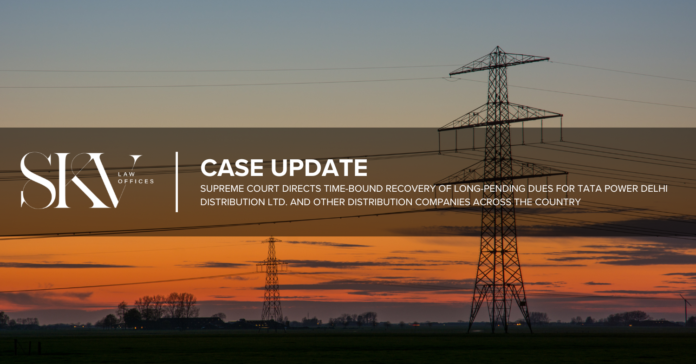Supreme Court Directs Time-Bound Recovery of Long Pending Dues for Tata Power Delhi Distribution Ltd. and other Distribution Companies Across The Country
08.08.2025
Background and Contentions
In a landmark judgment with wide-ranging implications for India’s electricity sector, the Hon’ble Supreme Court of India has directed all State Electricity Regulatory Commissions (SERCs), including the Delhi Electricity Regulatory Commission (DERC), to formulate time-bound roadmaps for the liquidation of long-pending Regulatory Assets. The judgment was delivered in writ petitions filed by BSES Discoms and Tata Power Delhi Distribution Limited (TPDDL), which sought directions for recovery of deferred tariff dues expressly recognised in DERC’s own tariff orders. Taking note of the systemic nature of the issue, the Court expanded the scope of the proceedings to address the nationwide accumulation of Regulatory Assets, affecting power distribution companies across India.
Regulatory Assets are deferred cost recoveries created by Electricity Regulatory Commissions when the approved consumer tariff is lower than the actual cost incurred by distribution companies (DISCOMs). Instead of allowing a steep tariff hike in a single year, the uncovered portion is “parked” as a Regulatory Asset and allowed to be recovered gradually over future years, ideally within a specific time frame. However, when such deferment continues indefinitely without a defined recovery plan, it distorts the financial health of DISCOMs and burdens consumers with rising interest costs.
SKV representing TPDDL, sought enforcement of its statutory right to recover approximately Rs. 5800 Crores in Regulatory Assets that had accumulated over nearly two decades due to the repeated deferment of cost-reflective tariffs by the DERC. Despite express recognition of these costs in successive tariff orders, including the most recent order dated 19.07.2024, DERC had failed to formulate any concrete roadmap for recovery. It was argued that such indefinite deferment was in violation of the Electricity Act, 2003, the National Tariff Policies of 2006 and 2016, and multiple advisories issued by the Ministry of Power.
Supreme Court’s Observations and Directions
Taking cognisance of the systemic nature of the issue, the Hon’ble Supreme Court expanded the scope of the proceedings to cover all States and Union Territories, observing that Regulatory Assets totalling over Rs. 1.5 lakh Crores had accumulated across the country.
In its judgment, the Hon’ble Supreme Court came down heavily on the inefficiencies of several SERCs, observing that the unchecked and disproportionate accumulation of Regulatory Assets amounted to a systemic regulatory failure. The Hon’ble Court held that deferring legitimate cost recovery without a clear repayment plan violated the mandate of cost-reflective tariff determination under Sections 62(1) and 62(4) of the Electricity Act, and frustrated the objectives of the National Tariff Policies of 2006 and 2016, both of which limit the recovery of Regulatory Assets to a period not exceeding seven years, including carrying costs.
The Hon’ble Court also relied upon communications issued by the Ministry of Power, which had repeatedly cautioned SERCs against indefinite deferment of dues. Recognising that such inaction distorts consumer tariffs, undermines DISCOM viability, and erodes transparency in the sector, the Hon’ble Court directed all SERCs to submit a time-bound roadmap for the liquidation of outstanding Regulatory Assets within 4 years (starting from 01.04.2024). The Appellate Tribunal for Electricity (APTEL) was also tasked with monitoring compliance, pursuant to its powers under Section 121 of the Electricity Act.
Apart from the time-bound recovery of Regulatory Assets and APTEL’s monitoring role, the Hon’ble Supreme Court also issued several other significant directions aimed at strengthening the regulatory framework. The Court directed all SERCs to strictly ensure that the gap between the approved and projected Aggregate Revenue Requirement (ARR) does not exceed 3%, in order to avoid the unchecked build-up of future Regulatory Assets. It also called for strict adherence to the National Tariff Policy, particularly the provisions mandating recovery of Regulatory Assets, if created, within a period of three years..
The Hon’ble Court emphasised that tariff increases must be reasonable, gradual, and properly justified, and advised SERCs to explore mechanisms to delink Regulatory Asset recovery from abrupt tariff hikes to reduce consumer impact. Most notably, the judgment reiterated that SERCs must act independently and discharge their statutory duties free from administrative interference, reaffirming the foundational principles of transparency, financial prudence, and consumer-centric regulation.
Implications for the Power Sector
This judgment marks a turning point for India’s power sector. By putting an end to the long-standing practice of delaying cost recovery without clear timelines, the Hon’ble Supreme Court has made it clear that fair electricity pricing cannot come at the cost of financial mismanagement. The direction to clear existing Regulatory Assets within a set timeframe brings much-needed financial discipline into how electricity tariffs are determined. Power distribution companies across the country, many of which have been under financial strain, will now have legal support to recover their approved costs in a timely manner.
This judgment marks a pivotal moment in India’s regulatory landscape by reinforcing the statutory obligation of regulatory commissions to ensure timely recovery of admitted costs, thus upholding financial viability in the power distribution sector. It also strengthens investor confidence by signalling judicial intolerance for indefinite deferment of tariff dues, particularly when such deferment undermines the commercial principles enshrined in the law.
TPDDL was represented by Shri Venkatesh (Founding Partner), along with Ashutosh K. Srivastava (Partner), Nihal Bharadwaj (Counsel), and Aashwyn Singh (Senior Associate) from SKV Law Offices.
[ad_1]
Source link

